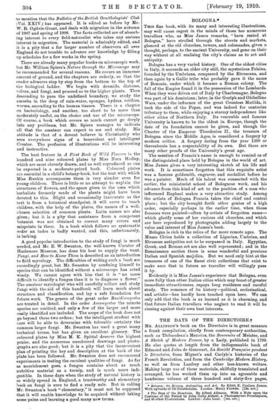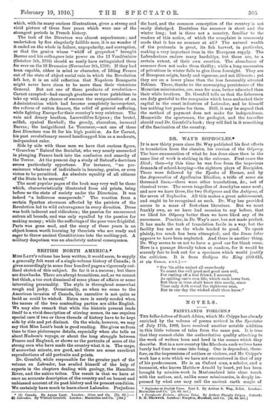THE DAYS OF THE DIRECTOIRE.f.
MB. ALLINSON'S book on the Directoire is in great measure a frank compilation, chiefly from contemporary authorities, such as Thibaudeau's Memoirs, the Souvenirs of Meister, and A Sketch of Modern France, by a Lady, published in 1798. He also quotes at length from the indispensable book of Edmond and Jules de Goncourt, La Societe Frangaise pendant le Directoire, from Mignet's and Carlyle's histories of the French Revolution, and from the Cambridge Modern History, as well as from Lanfrey and other less-known writers. Making large use of these materials, skilfully translated and arranged, he has worked them up into an agreeable and handsome volume of three hundred and sixty-five pages,
• Bologna: its History, Antiquities, and Art. By Edith E. Coulson James. With upwards of 100 Illustrations. London : Henry Frowde. [12s. net.] t The Days of the Directoire. By Alfred Allinson. With a Note upon the Costume of the Period by John Colby Abbott, a Photogravure Frontispiece, and 48 other Illustrations. London : John Lane. [16s. net.]
which, with its many curious illustrations, gives a strong and vivid picture of those four years which were one of the strangest periods in French history.
The task of the Directors was almost superhuman ; and undertaken by five singularly fallible men, it is no wonder if it ended on the whole in failure, unpopularity, and corruption, or that the genius whose "whiff of grapeshot" brought Barras and his colleagues into power on the 13 Vendemiaire (October 5th, 1795) should so easily have extinguished them for ever on the 18 Brumaire (November 9th,1799). If they had been capable, either in mind or character, of lifting France out of the state of abject social ruin in which the Revolution left her, it is an odd reflection that Napoleon Bonaparte might never have risen to be more than their victorious General. But not one of these products of revolution- Carnot excepted—had enough greatness or true patriotism to take up with any chance of success the reorganisation of an Administration which had become completely incompetent, the reform of rotten finance, the relief of general suffering, while fighting Europe for their country's very existence. The -vain and dreary heathen, Larevelliere-Lepaux ; the brutal, selfish, cynical Rewhell ; the greedy, shameless, immoral Barras ; the insignificant Le Tourneur,—not one of these first Directors was fit for his high position. As for Carnet, his past revolutionary record handicapped him as a moderate, independent ruler.
Side by side with these men we have that curious figure, " Gracchus " Babeuf the Socialist, who very nearly succeeded in plunging France back into the confusion and anarchy of the Terror. At the present day a study of Babeuf's doctrines seems particularly opportune. For instance, "no pre- eminence whatever of individuals in learning, genius, or even virtue to be permitted. An absolute equality of all citizens of the State to be secured."
The most popular pages of the book may very well be those which, characteristically illustrated from old prints, bring before us the state of society under the Directoire. It was indeed "a ludicrous masquerade." The reaction from a certain Spartan sternness affected by the patriots of the Revolution led to wild extravagance in every direction. Dress was both indecent and ridiculous ; the passion for amusement outran all bounds, and was only equalled by the passion for making money ; while the sufferings of the poor were frightful. Paris was gone mad, and the story of these years is an object-lesson worth learning by theorists who are ready and eager to throw ancient Constitutions into the melting-pot. A military despotism was an absolutely natural consequence.









































 Previous page
Previous page